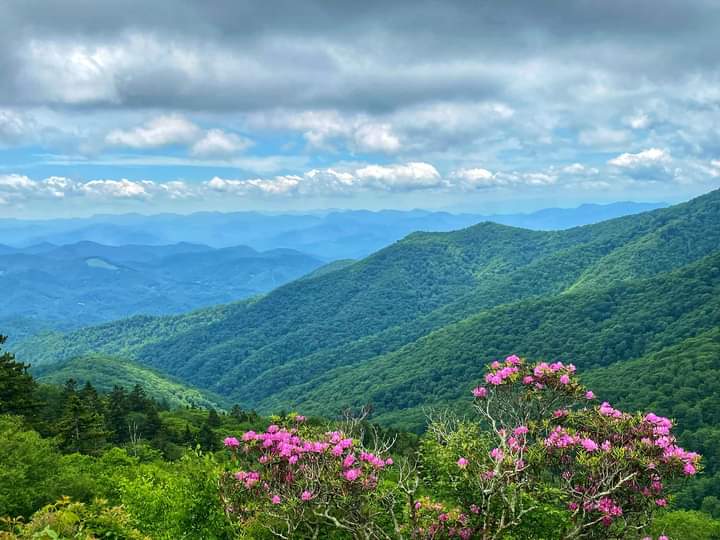
Asheville: Gateway to Adventure and Culture in the Blue Ridge Mountains
Asheville blends the buzz of an artsy city with easy access to the Blue Ridge Mountains’ rugged trails and rivers. Whether you crave manageable hikes or challenging summits, this destination offers a practical yet inspiring base for your next outdoor adventure.
Start Early and Hydrate
Begin hikes in the morning to avoid afternoon heat and bring at least two liters of water per person for longer excursions.
Dress in Layers
Mountain weather can shift quickly; wear breathable, moisture-wicking layers and pack a waterproof shell.
Wear Sturdy Footwear
Choose hiking boots with ankle support to handle rocky, uneven terrain safely.
Respect Wildlife and Environment
Stay on marked trails and maintain distance from animals to minimize impact and ensure your safety.
Asheville: Gateway to Adventure and Culture in the Blue Ridge Mountains
Sitting just beyond the shifting ridges of the Blue Ridge Mountains, Asheville offers both a pulse of vibrant city life and easy access to some of North Carolina’s most compelling outdoor adventures. The city itself hums with energy—from eclectic art galleries and farm-to-table eateries to live music echoing from its streets. Yet, a short drive from downtown opens a door to trails where forests dare you to push deeper, rivers coax you forward with rushing currents, and mountaintops reward with views stretching far beyond the horizon.
Start with the famed Blue Ridge Parkway, where multiple trailheads invite hikers of all levels. The hike to Craggy Gardens is a manageable 1.5-mile trek with an elevation gain of roughly 400 feet, leading through dense spruce forests and bursts of wild rhododendron. It’s a perfect introduction that demands attention without overwhelming. For a longer commitment, the Mount Mitchell Trail challenges with a steady climb over 5 miles, gaining more than 3,600 feet—the highest peak east of the Mississippi. Keep in mind the trail’s rocky footing and sudden weather shifts; this mountain is fiercely alive and must be respected.
Planning your day begins with early morning starts to avoid afternoon heat and potential storms, especially in summer. Hydration is non-negotiable—bring at least two liters per person for longer hikes. Footwear needs to be sturdy, with good ankle support given the uneven terrain and occasional slick rock surfaces. Don’t overlook weather-appropriate layers; mountain conditions can turn suddenly.
Asheville’s adventurous spirit isn’t confined to hiking. The French Broad River tempts kayakers and anglers alike, where swift currents both reward and challenge. For those seeking to immerse in culture after days on the trail, downtown’s blend of craft breweries, farm markets, and art studios provides ample space to recharge and celebrate the day’s exertion.
Whether you’re tracing ridges lined with dense forests or exploring vibrant city streets filled with Southern charm, Asheville stands as a practical gateway to both thrill and comfort. The region invites you not only to visit but to engage with a landscape and community alive, demanding respect, rewarding effort, and offering memories carved deeply into both hills and heart.
Nearby Trips
All Adventures
Boat Charters
Water Activities
Adventures near Asheville, North Carolina
Discover the unique and memorable adventures that make Asheville, North Carolina special.
Frequently Asked Questions
What is the best time of day to hike near Asheville?
Early morning is ideal to avoid afternoon heat, crowds, and unexpected thunderstorms, especially in summer months. Sunrise hikes also provide the best lighting and quieter trails.
Are dogs allowed on the trails around Asheville?
Many trails near Asheville are dog-friendly but require dogs to be leashed. It's best to check specific trail regulations and always clean up after your pet to preserve the environment.
How accessible are Asheville’s trails for beginners?
There are a variety of options from easy, short nature walks like Craggy Gardens to more challenging hikes like Mount Mitchell. Beginners should start with easier trails and gradually build endurance.
What safety precautions should I take during hikes here?
Bring sufficient water, dress in layers, check weather forecasts before heading out, and carry a basic first aid kit. Cell service can be spotty on remote trails, so inform someone of your plans.
Can I combine hiking with other outdoor activities in Asheville?
Yes, the French Broad River offers kayaking, paddleboarding, and fishing opportunities near Asheville, making it easy to mix multiple outdoor experiences in one trip.
Are there guided hikes or tours available in Asheville?
Several local outfitters and guides offer hiking tours and nature walks, which can enhance your experience with local knowledge and safety expertise.
Recommended Gear
Hiking Boots
Provide ankle support and grip for uneven and rocky terrain common around Asheville’s trails.
Hydration Pack or Water Bottles
Ensures adequate hydration during warm hikes; recommended to carry at least two liters.
Layered Clothing
Allows adjustment to changing temperatures and weather conditions typical in mountain environments.
Rain Jacket
Protects against afternoon showers and sudden weather changes common in the region.
Local Insights
Hidden Gems
- "Cattail Falls—a multi-tiered waterfall accessible via a quiet, moderately challenging trail inside Pisgah National Forest."
- "The Folk Art Center on the Blue Ridge Parkway features Appalachian crafts often overlooked by casual visitors."
Wildlife
- "Black bears roam the higher elevations but tend to avoid hikers—stay alert and store food properly."
- "Look for the elusive Carolina northern flying squirrel during dusk in spruce-fir forests."
History
"Asheville grew rapidly in the early 20th century as a health retreat and remains rich with Art Deco architecture and stories linked to the Cherokee people who lived here for centuries."
